Unit 4 Don’t eat in class.SectionA1a-2dSectionB1a-1d课件2023-2024学年度人教版英语七年级下册
文档属性
| 名称 | Unit 4 Don’t eat in class.SectionA1a-2dSectionB1a-1d课件2023-2024学年度人教版英语七年级下册 |  | |
| 格式 | pptx | ||
| 文件大小 | 17.4MB | ||
| 资源类型 | 试卷 | ||
| 版本资源 | 人教新目标(Go for it)版 | ||
| 科目 | 英语 | ||
| 更新时间 | 2024-03-08 15:12:40 | ||
图片预览

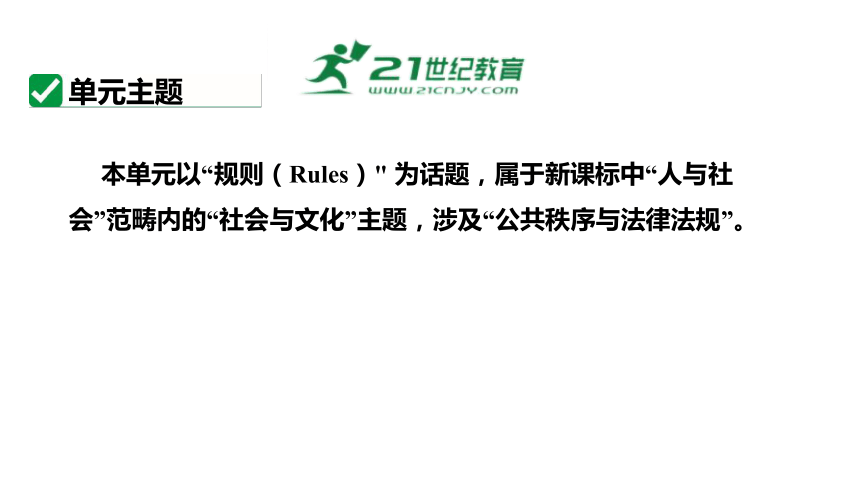
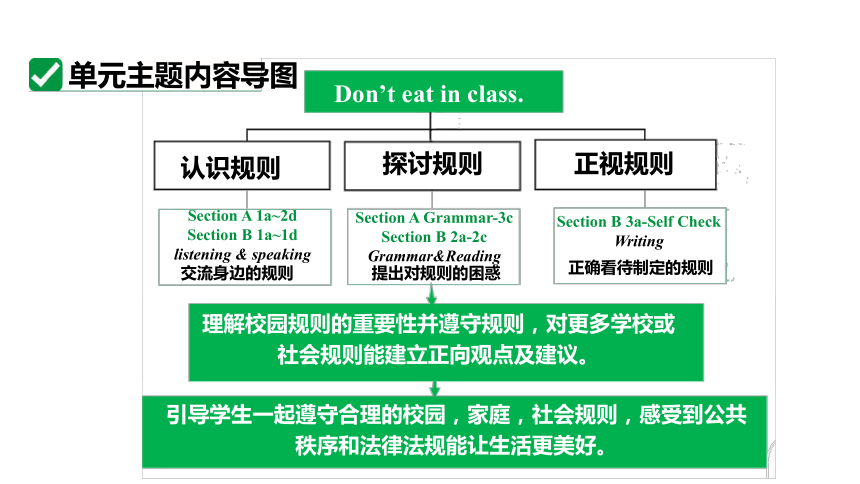
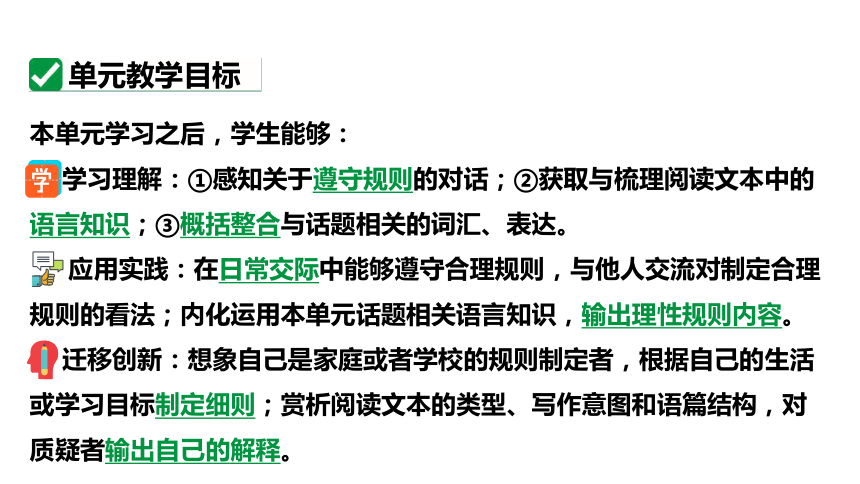
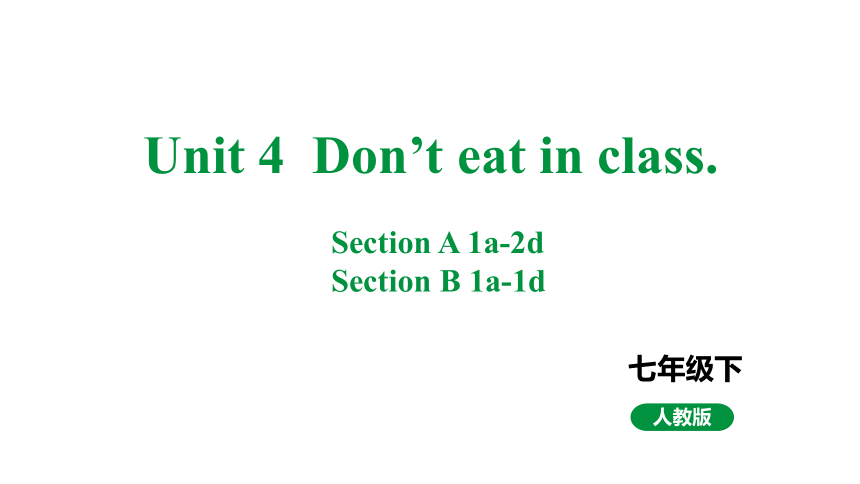

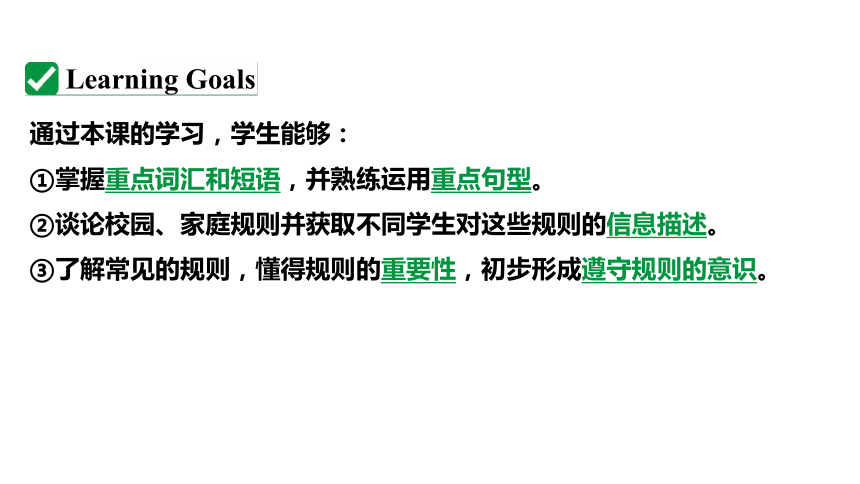
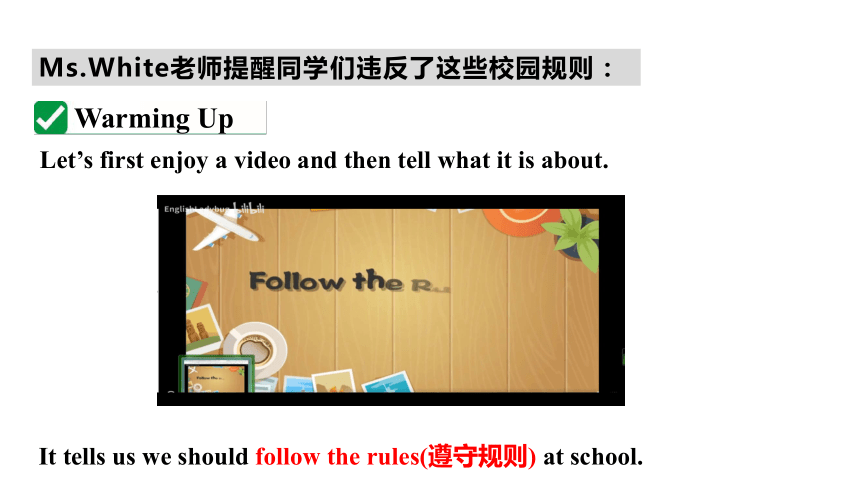
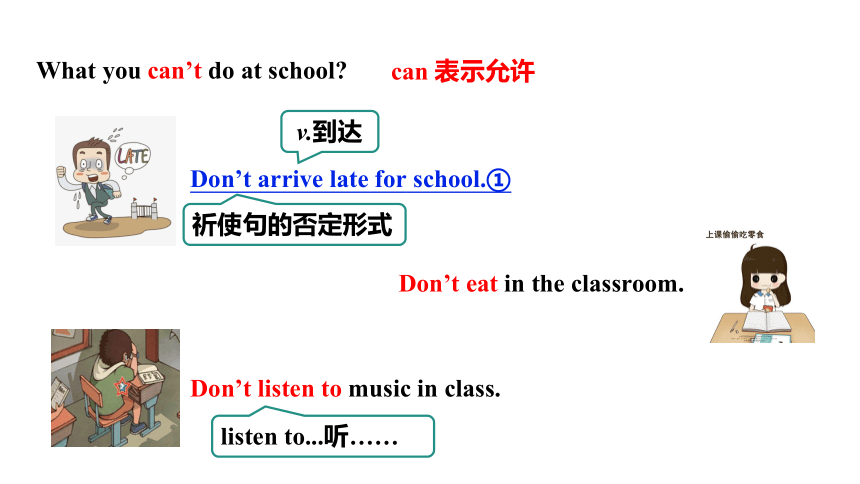
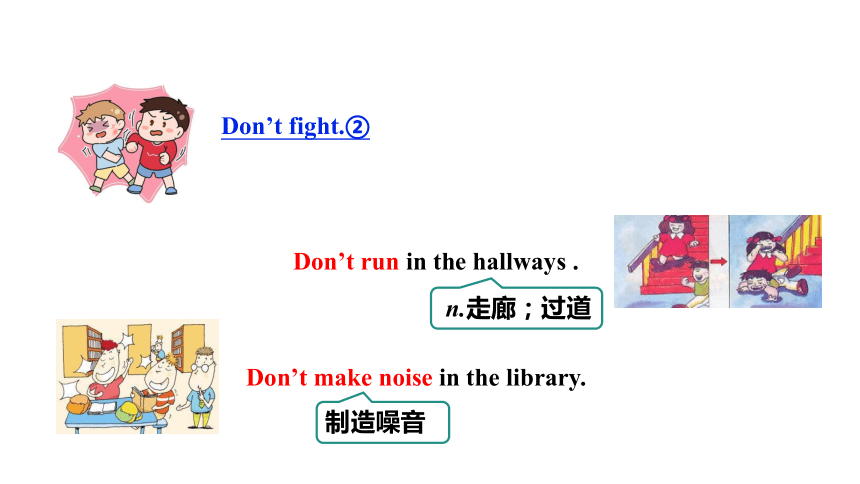


文档简介
(共45张PPT)
Unit 4 Don’t eat in class.
大 单 元 教 学
七年级下
人教版
单元主题
本单元以“规则(Rules)" 为话题,属于新课标中“人与社会”范畴内的“社会与文化”主题,涉及“公共秩序与法律法规”。
交流身边的规则
提出对规则的困惑
正确看待制定的规则
Section A 1a~2d
Section B 1a~1d
listening & speaking
Section A Grammar-3c
Section B 2a-2c
Grammar&Reading
Section B 3a-Self Check
Writing
认识规则
探讨规则
正视规则
单元主题内容导图
Don’t eat in class.
理解校园规则的重要性并遵守规则,对更多学校或社会规则能建立正向观点及建议。
引导学生一起遵守合理的校园,家庭,社会规则,感受到公共秩序和法律法规能让生活更美好。
本单元学习之后,学生能够:
学习理解:①感知关于遵守规则的对话;②获取与梳理阅读文本中的语言知识;③概括整合与话题相关的词汇、表达。
应用实践:在日常交际中能够遵守合理规则,与他人交流对制定合理规则的看法;内化运用本单元话题相关语言知识,输出理性规则内容。
迁移创新:想象自己是家庭或者学校的规则制定者,根据自己的生活或学习目标制定细则;赏析阅读文本的类型、写作意图和语篇结构,对质疑者输出自己的解释。
单元教学目标
Section A 1a-2d
Section B 1a-1d
七年级下
人教版
Unit 4 Don’t eat in class.
老师们和同学们一起交流需要遵守的校园或家庭规则,各抒己见。同学们通过整理常见的校园或家庭行为活动,判断得出生活中应该遵守的基本规则,感悟约束的力量。
核心任务
通过本课的学习,学生能够:
①掌握重点词汇和短语,并熟练运用重点句型。
②谈论校园、家庭规则并获取不同学生对这些规则的信息描述。
③了解常见的规则,懂得规则的重要性,初步形成遵守规则的意识。
Learning Goals
Let’s first enjoy a video and then tell what it is about.
It tells us we should follow the rules(遵守规则) at school.
Warming Up
Ms.White老师提醒同学们违反了这些校园规则:
What you can’t do at school
Don’t arrive late for school.①
Don’t eat in the classroom.
Don’t listen to music in class.
can 表示允许
祈使句的否定形式
v.到达
listen to...听……
Don’t fight.②
Don’t run in the hallways .
Don’t make noise in the library.
n.走廊;过道
制造噪音
Look at the picture and read the school rules in the picture.
SCHOOL RULES
1. Don’t arrive late for class.
You must be on time.
2. Don’t run in the hallways.
3. Don’t eat in the classroom.
You must eat in the dining hall.
4. Don’t listen to music in class.
5. Don’t fight.
准时
餐厅
情态动词
表必须
Pre-listening
Ms.Clark老师提出学生应该遵守这些规则:
SectionA 1a Which rules are these students breaking Write the number of the rule next to the student.
1
2
3
4
5
SCHOOL RULES
1. Don’t arrive late for class.
You must be on time.
2. Don’t run in the hallways.
3. Don’t eat in the classroom.
You must eat in the dining hall.
4. Don’t listen to music in class.
5. Don’t fight.
Three students are breaking the rules. They are Peter, Amy and Mike.
SectionA 1b Listen. What rules are these students breaking Write the numbers after the names.
Peter______ Amy______ Mike______
2
3
4
Tip: You can take down the key words for each person while listening.
Key
words
run
eat
listen
While-listening
Ms.Clark老师指出学生Peter,Amy和Mike的违规行为:
Let’s listen again. You can read after the tape.
Ms. Clark: Hey, Peter. You know the rules. Don’t run in the hallways.
Peter: Sorry, Ms. Clark.
Mr. Smith: Amy, don’t eat in the classroom. You must eat in the dining hall.
Amy: Oh, sorry, Mr. Smith.
Mr. Smith: Hey, Mike, don’t listen to music in class. Mike!
Boy: He can’t hear you, Mr. Smith.
1) Are Peter and Amy polite to the teacher Why do you think so
Yes, they are. They say “Sorry”to the teacher.
2) Does Mike say “Sorry” to the teacher Why doesn’t he say “Sorry”
No, he doesn’t. He is listening to music and he can’t hear the teacher.
Tip: We should always say “Sorry” when we break the rules.
Let’s look at the table in Section A 2a. There are eight activities. Students can do some of them in the classroom, and some they can’t do. Can you read and guess what they can do and what they can’t do
Alan分享了自己需要遵守的校园规则:
SectionA 2a Listen. Check (√) the activities Alan and Cindy talk about.
1. ___listen to music in the classroom or hallways can can’t
2. ___listen to music in the music room can can’t
3. ___listen to music outside can can’t
4. ___ eat in the classroom can can’t
5. ___eat in the dining hall can can’t
6. ___eat outside can can’t
7. ___wear a hat can can’t
8. ___fight can can’t
√
√
√
√
√
√
√
adj.外面的;adv. 在外面
SectionA 2b Listen again. Circle can or can’t.
1. ___listen to music in the classroom or hallways can can’t
2. ___listen to music in the music room can can’t
3. ___listen to music outside can can’t
4. ___ eat in the classroom can can’t
5. ___eat in the dining hall can can’t
6. ___eat outside can can’t
7. ___wear a hat can can’t
8. ___fight can can’t
√
√
√
√
√
√
√
Let’s listen again. You can read after the tape.
Cindy: What are the school rules, Alan
Alan: Well, we can’t listen to music in the classroom or hallways. But we can listen to it outside or in the music room.
Cindy: Uh-huh.
Alan: And we can’t eat in the classroom, but we can eat in the dining hall.
Cindy: Oh. And can we wear a hat in class
Alan: No, we can’t. What else Oh, you can’t fight with your classmates. That makes the teachers really unhappy.
Cindy: I see.
和……打架
SectionA 2c Student A is Alan and Student B is Cindy. Talk about the rules in 2a.
Can we listen to
music, Cindy
We can’t listen to music in the hallways, but we can listen to it outside.
SectionA 1c Student A is a new student. Student B tells Student A about the rules above.
Well, we can’t arrive late for class. We must be on time.
What are the rules
Can we eat in the classroom
No, we can’t.
Can we ...
同学们着重给新同学介绍需要遵守的校园规则:
SectionA 2dRole-play the conversation.
John: Hi, my name’s John. It’s my first day at school.
Alice: Hi, John. I’m Alice. This is a great school, but there are a lot of rules.
John: Really What are some of the rules
Alice: Well, don’t be late for class. This is very important.
John: OK, so we must be on time. Can we bring music players to school
Alice: No, we can’t. And we always have to wear the school uniform.
John: I see.
Alice: Oh, and we also have to be quiet in the library.
adj.重要的
v.带来
n.校服;制服
adj.安静的
情态动词;不得不
Now let’s listen to a conversation between Dave and Emily. Listen carefully to the rules. Focus on what Dave can’t do, what he has to do or what he must do. The focus is not on when he can do, can’t do or must do something
除校园规则外,Dave同学谈到了自己的家庭规则内容。
Dave has some family rules. Look at the pictures below.
Is he at home now
When can you go out
go out 外出(娱乐)
out /a t/ adv. 外出
Dave首先分享了自己受到规则约束的一些日常活动。
What’s he doing
do the dishes 清洗餐具
dish /d / n. 碟;盘
Do you often do the dishes at home
What’s he doing
do his homework
做他的家庭作业
When do you often do your homework
What’s he doing
help his mom make breakfast
帮他的妈妈做早饭
Do you often help your mom with breakfast
What’s he doing
practice the guitar 练习吉他
practice / pr kt s / v. & n. 练习
Can you play the guitar
What’s he doing
clean his room
打扫他的房间
Do you often clean your room
What’s he doing
watch TV
看电视
When and how long can you watch TV every day
Is he out or is he at home
Who is the boy and the girl
see friends 看望朋友
When do you often see your friends
We all have some rules at home. We should always obey(遵守) those rules. Remember: Nothing can be accomplished without norms or standards.(没有规矩不成方圆)
SectionB 1a Read the rules in the chart in 1b. Then match the pictures [a-h] with the rules.
a
c
e
g
b
d
f
h
Rules Can’t(×) Have to/Must(√) When
a go out on school nights
see friends
do his homework
practice the guitar
do the dishes
watch TV
help his mom make breakfast
clean his room
h
c
e
b
g
d
f
Section B 1b Listen and put an × for things Dave can’t do and a √ for things he has to do.
Rules Can’t(×) Have to/Must(√) When
a go out on school nights
h see friends
c do his homework
e practice the guitar
b do the dishes
g watch TV
d help his mom make breakfast
f clean his room
×
×
×
√
√
√
√
√
接着Dave分享了需要遵守的家庭规则细则:
Section B 1c Listen again. Write when Dave has to follow the rules in the chart in 1b. Choose from the phrases in the box.
Rules Can’t(×) Have to/Must(√) When
a go out on school nights
h see friends
c do his homework
e practice the guitar
b do the dishes
g watch TV
d help his mom make breakfast
f clean his room
×
×
×
√
√
√
√
√
on school days
after school
before dinner
after dinner
in the evening
every morning
every Saturday
Let’s listen again. You can read after the tape.
Emily: Hi, Dave. Do you want to watch the basketball game in the park this evening
Dave: I’d love to, but I can’t go out on school nights.
Emily: Oh, that’s too bad.
Dave: Yeah, I have so many rules...
Emily: Really
Dave: Yeah, I can’t see my friends on school days and I have to do my homework after school.
Emily: What other rules do you have
Dave: Mmm... I must practice the guitar before dinner and then I have to do the dishes after dinner. And I can’t watch TV in the evening.
Emily: Oh. Well, I have to help my mom make dinner sometimes.
Dave: Me, too. I have to help my mom make breakfast every morning. And I must clean my room every Saturday.
Emily: Wow, you do have a lot of rules!
do在此处表示强调
Let’s talk about Class Rules.
write or draw on the desks write or draw on the wall
use mobile phones sit on the desks
play ping-pong chew gum
play with chalk run around in the classroom
speak or laugh loudly in the classroom
read comic books or picture books in class or in the classroom
—Can we ... —Yes, we can./ No, we can’t.
v.咀嚼
n.粉笔
漫画书
Post-listening
同学们根据常见学校行为活动,鉴别校园规则:
Section B 1d Talk about the rules in Dave’s house.
No, he can’t.
Can Dave go out on school nights
Can you talk about your family rules
Let’s talk about Family Rules.
同学们根据Dave的家庭生活,探究更多家庭规则:
遵守规则 ______________________
听…… ______________________
和某人打架 ______________________
制造噪音 ______________________
准时 ______________________
不得不 ______________________
外出(娱乐) ______________________
清洗餐具 ______________________
follow the rules
fight with sb./have a fight with sb.
make noise
(be) on time
listen to...
have to
Key Phrases
go out
do the dishes
1.Don’t arrive late for school.
arrive到达,是不及物动词,具体用法如:
若接地点名词,要加介词in或at。 in后接大地方(如城市或国家)。
at后接小地方(如学校、酒店或车站)。
若接地点副词(here/there/home等),则不用介词。
When did you arrive in Dalian
你是什么时候到大连的?
I usually arrive at the bus stop at 6:30
every morning.
我通常每天早晨6:30到公共汽车站。
My father arrives home late every night.
我爸爸每天晚上很晚到家。
Language Points
Instant Training
1.他是第一个到达学校的。
He is the first to _______________ .
2.我们一家在五月的一个美丽的早晨到达了英格兰。
My family _________________ on a beautiful morning in May.
3.当我奶奶到家时,我拿出了一些新鲜的苹果。
When my grandma ____________, I took out some fresh apples .
arrive at school
arrived in England
arrived home
2.Don’t fight.
(1)fight在句中作动词,意为“打架”fight with sb.“和某人打架”。
Don’t fight with the driver in the bus, or you’ll be punished.
在公交车上不得与司机打架,否则你将会受到惩罚。
(2)fight作动词,还有“战斗”的意思。
They fought against the enemy fiercely. 他们与敌人进行了殊死搏斗。
(3)fight也可作名词,意为“打架;战斗”,短语have a fight(with sb.)
表示“(和某人)打架”。
It’s not right to have a fight with your friend. 和朋友打架是不对的
Instant Training
1.不要再和他打架了。
Don't _________ him any more.
2.人们团结一心与洪水作斗争。
The people united to ___________ the flood.
3.在学校我们不能相互打架。
We can't ___________________each other at school.
fight with
fight against
have a fight with
1.Here are the school________(规则).
2.Don’t________(到达) too late in the morning.
3.Don’t ________(打架) with classmates.
4.Remeber to________(带来) the textbooks and wear your ________(制服).
5. You must get to school ________ (按时).
rules
arrive
fight
bring
on time
Exercises
同学们分类汇总了校园和家庭规则,感悟约束力量:
uniforms
6.Please (清洁) your room after you get up.
7.Please (回到) home on time every day.
8. (not) eat ice cream after dinner.
9. (做) your homework first when you get home.
10.Say________(抱歉的) if you break the cups.
clean
come
Don’t
Do
sorry
11.Please (练习) your guitar before dinner.
12. (听) English tapes every day at home.
13. Be (安静) after 21:00.
14. Please _________________(清洗餐具) on weekends.
15.Leave a message if you want to_______(外出).
practice
Listen to
quiet
do the dishes
go out
1. Listening and speaking: School and family rules.
2. Words and Expressions:
rule, arrive, hallway, dining, hall, listen, fight, sorry, outside, wear, bring, important, uniform, quiet, (be) on time, dining hall, listen to, have to,out, practice, dish, before, go out, do the dishes
3. Key sentences:
①—What are the rules
—Well, we can’t arrive late for class.We must be on time.
②We can’t listen to music in the hallways but we can listen to it outside.
③I can’t go out on school nights.
④I have to do my homework after school.
⑤I must practice the guitar before dinner.
Summary
Unit 4 Don’t eat in class.
大 单 元 教 学
七年级下
人教版
单元主题
本单元以“规则(Rules)" 为话题,属于新课标中“人与社会”范畴内的“社会与文化”主题,涉及“公共秩序与法律法规”。
交流身边的规则
提出对规则的困惑
正确看待制定的规则
Section A 1a~2d
Section B 1a~1d
listening & speaking
Section A Grammar-3c
Section B 2a-2c
Grammar&Reading
Section B 3a-Self Check
Writing
认识规则
探讨规则
正视规则
单元主题内容导图
Don’t eat in class.
理解校园规则的重要性并遵守规则,对更多学校或社会规则能建立正向观点及建议。
引导学生一起遵守合理的校园,家庭,社会规则,感受到公共秩序和法律法规能让生活更美好。
本单元学习之后,学生能够:
学习理解:①感知关于遵守规则的对话;②获取与梳理阅读文本中的语言知识;③概括整合与话题相关的词汇、表达。
应用实践:在日常交际中能够遵守合理规则,与他人交流对制定合理规则的看法;内化运用本单元话题相关语言知识,输出理性规则内容。
迁移创新:想象自己是家庭或者学校的规则制定者,根据自己的生活或学习目标制定细则;赏析阅读文本的类型、写作意图和语篇结构,对质疑者输出自己的解释。
单元教学目标
Section A 1a-2d
Section B 1a-1d
七年级下
人教版
Unit 4 Don’t eat in class.
老师们和同学们一起交流需要遵守的校园或家庭规则,各抒己见。同学们通过整理常见的校园或家庭行为活动,判断得出生活中应该遵守的基本规则,感悟约束的力量。
核心任务
通过本课的学习,学生能够:
①掌握重点词汇和短语,并熟练运用重点句型。
②谈论校园、家庭规则并获取不同学生对这些规则的信息描述。
③了解常见的规则,懂得规则的重要性,初步形成遵守规则的意识。
Learning Goals
Let’s first enjoy a video and then tell what it is about.
It tells us we should follow the rules(遵守规则) at school.
Warming Up
Ms.White老师提醒同学们违反了这些校园规则:
What you can’t do at school
Don’t arrive late for school.①
Don’t eat in the classroom.
Don’t listen to music in class.
can 表示允许
祈使句的否定形式
v.到达
listen to...听……
Don’t fight.②
Don’t run in the hallways .
Don’t make noise in the library.
n.走廊;过道
制造噪音
Look at the picture and read the school rules in the picture.
SCHOOL RULES
1. Don’t arrive late for class.
You must be on time.
2. Don’t run in the hallways.
3. Don’t eat in the classroom.
You must eat in the dining hall.
4. Don’t listen to music in class.
5. Don’t fight.
准时
餐厅
情态动词
表必须
Pre-listening
Ms.Clark老师提出学生应该遵守这些规则:
SectionA 1a Which rules are these students breaking Write the number of the rule next to the student.
1
2
3
4
5
SCHOOL RULES
1. Don’t arrive late for class.
You must be on time.
2. Don’t run in the hallways.
3. Don’t eat in the classroom.
You must eat in the dining hall.
4. Don’t listen to music in class.
5. Don’t fight.
Three students are breaking the rules. They are Peter, Amy and Mike.
SectionA 1b Listen. What rules are these students breaking Write the numbers after the names.
Peter______ Amy______ Mike______
2
3
4
Tip: You can take down the key words for each person while listening.
Key
words
run
eat
listen
While-listening
Ms.Clark老师指出学生Peter,Amy和Mike的违规行为:
Let’s listen again. You can read after the tape.
Ms. Clark: Hey, Peter. You know the rules. Don’t run in the hallways.
Peter: Sorry, Ms. Clark.
Mr. Smith: Amy, don’t eat in the classroom. You must eat in the dining hall.
Amy: Oh, sorry, Mr. Smith.
Mr. Smith: Hey, Mike, don’t listen to music in class. Mike!
Boy: He can’t hear you, Mr. Smith.
1) Are Peter and Amy polite to the teacher Why do you think so
Yes, they are. They say “Sorry”to the teacher.
2) Does Mike say “Sorry” to the teacher Why doesn’t he say “Sorry”
No, he doesn’t. He is listening to music and he can’t hear the teacher.
Tip: We should always say “Sorry” when we break the rules.
Let’s look at the table in Section A 2a. There are eight activities. Students can do some of them in the classroom, and some they can’t do. Can you read and guess what they can do and what they can’t do
Alan分享了自己需要遵守的校园规则:
SectionA 2a Listen. Check (√) the activities Alan and Cindy talk about.
1. ___listen to music in the classroom or hallways can can’t
2. ___listen to music in the music room can can’t
3. ___listen to music outside can can’t
4. ___ eat in the classroom can can’t
5. ___eat in the dining hall can can’t
6. ___eat outside can can’t
7. ___wear a hat can can’t
8. ___fight can can’t
√
√
√
√
√
√
√
adj.外面的;adv. 在外面
SectionA 2b Listen again. Circle can or can’t.
1. ___listen to music in the classroom or hallways can can’t
2. ___listen to music in the music room can can’t
3. ___listen to music outside can can’t
4. ___ eat in the classroom can can’t
5. ___eat in the dining hall can can’t
6. ___eat outside can can’t
7. ___wear a hat can can’t
8. ___fight can can’t
√
√
√
√
√
√
√
Let’s listen again. You can read after the tape.
Cindy: What are the school rules, Alan
Alan: Well, we can’t listen to music in the classroom or hallways. But we can listen to it outside or in the music room.
Cindy: Uh-huh.
Alan: And we can’t eat in the classroom, but we can eat in the dining hall.
Cindy: Oh. And can we wear a hat in class
Alan: No, we can’t. What else Oh, you can’t fight with your classmates. That makes the teachers really unhappy.
Cindy: I see.
和……打架
SectionA 2c Student A is Alan and Student B is Cindy. Talk about the rules in 2a.
Can we listen to
music, Cindy
We can’t listen to music in the hallways, but we can listen to it outside.
SectionA 1c Student A is a new student. Student B tells Student A about the rules above.
Well, we can’t arrive late for class. We must be on time.
What are the rules
Can we eat in the classroom
No, we can’t.
Can we ...
同学们着重给新同学介绍需要遵守的校园规则:
SectionA 2dRole-play the conversation.
John: Hi, my name’s John. It’s my first day at school.
Alice: Hi, John. I’m Alice. This is a great school, but there are a lot of rules.
John: Really What are some of the rules
Alice: Well, don’t be late for class. This is very important.
John: OK, so we must be on time. Can we bring music players to school
Alice: No, we can’t. And we always have to wear the school uniform.
John: I see.
Alice: Oh, and we also have to be quiet in the library.
adj.重要的
v.带来
n.校服;制服
adj.安静的
情态动词;不得不
Now let’s listen to a conversation between Dave and Emily. Listen carefully to the rules. Focus on what Dave can’t do, what he has to do or what he must do. The focus is not on when he can do, can’t do or must do something
除校园规则外,Dave同学谈到了自己的家庭规则内容。
Dave has some family rules. Look at the pictures below.
Is he at home now
When can you go out
go out 外出(娱乐)
out /a t/ adv. 外出
Dave首先分享了自己受到规则约束的一些日常活动。
What’s he doing
do the dishes 清洗餐具
dish /d / n. 碟;盘
Do you often do the dishes at home
What’s he doing
do his homework
做他的家庭作业
When do you often do your homework
What’s he doing
help his mom make breakfast
帮他的妈妈做早饭
Do you often help your mom with breakfast
What’s he doing
practice the guitar 练习吉他
practice / pr kt s / v. & n. 练习
Can you play the guitar
What’s he doing
clean his room
打扫他的房间
Do you often clean your room
What’s he doing
watch TV
看电视
When and how long can you watch TV every day
Is he out or is he at home
Who is the boy and the girl
see friends 看望朋友
When do you often see your friends
We all have some rules at home. We should always obey(遵守) those rules. Remember: Nothing can be accomplished without norms or standards.(没有规矩不成方圆)
SectionB 1a Read the rules in the chart in 1b. Then match the pictures [a-h] with the rules.
a
c
e
g
b
d
f
h
Rules Can’t(×) Have to/Must(√) When
a go out on school nights
see friends
do his homework
practice the guitar
do the dishes
watch TV
help his mom make breakfast
clean his room
h
c
e
b
g
d
f
Section B 1b Listen and put an × for things Dave can’t do and a √ for things he has to do.
Rules Can’t(×) Have to/Must(√) When
a go out on school nights
h see friends
c do his homework
e practice the guitar
b do the dishes
g watch TV
d help his mom make breakfast
f clean his room
×
×
×
√
√
√
√
√
接着Dave分享了需要遵守的家庭规则细则:
Section B 1c Listen again. Write when Dave has to follow the rules in the chart in 1b. Choose from the phrases in the box.
Rules Can’t(×) Have to/Must(√) When
a go out on school nights
h see friends
c do his homework
e practice the guitar
b do the dishes
g watch TV
d help his mom make breakfast
f clean his room
×
×
×
√
√
√
√
√
on school days
after school
before dinner
after dinner
in the evening
every morning
every Saturday
Let’s listen again. You can read after the tape.
Emily: Hi, Dave. Do you want to watch the basketball game in the park this evening
Dave: I’d love to, but I can’t go out on school nights.
Emily: Oh, that’s too bad.
Dave: Yeah, I have so many rules...
Emily: Really
Dave: Yeah, I can’t see my friends on school days and I have to do my homework after school.
Emily: What other rules do you have
Dave: Mmm... I must practice the guitar before dinner and then I have to do the dishes after dinner. And I can’t watch TV in the evening.
Emily: Oh. Well, I have to help my mom make dinner sometimes.
Dave: Me, too. I have to help my mom make breakfast every morning. And I must clean my room every Saturday.
Emily: Wow, you do have a lot of rules!
do在此处表示强调
Let’s talk about Class Rules.
write or draw on the desks write or draw on the wall
use mobile phones sit on the desks
play ping-pong chew gum
play with chalk run around in the classroom
speak or laugh loudly in the classroom
read comic books or picture books in class or in the classroom
—Can we ... —Yes, we can./ No, we can’t.
v.咀嚼
n.粉笔
漫画书
Post-listening
同学们根据常见学校行为活动,鉴别校园规则:
Section B 1d Talk about the rules in Dave’s house.
No, he can’t.
Can Dave go out on school nights
Can you talk about your family rules
Let’s talk about Family Rules.
同学们根据Dave的家庭生活,探究更多家庭规则:
遵守规则 ______________________
听…… ______________________
和某人打架 ______________________
制造噪音 ______________________
准时 ______________________
不得不 ______________________
外出(娱乐) ______________________
清洗餐具 ______________________
follow the rules
fight with sb./have a fight with sb.
make noise
(be) on time
listen to...
have to
Key Phrases
go out
do the dishes
1.Don’t arrive late for school.
arrive到达,是不及物动词,具体用法如:
若接地点名词,要加介词in或at。 in后接大地方(如城市或国家)。
at后接小地方(如学校、酒店或车站)。
若接地点副词(here/there/home等),则不用介词。
When did you arrive in Dalian
你是什么时候到大连的?
I usually arrive at the bus stop at 6:30
every morning.
我通常每天早晨6:30到公共汽车站。
My father arrives home late every night.
我爸爸每天晚上很晚到家。
Language Points
Instant Training
1.他是第一个到达学校的。
He is the first to _______________ .
2.我们一家在五月的一个美丽的早晨到达了英格兰。
My family _________________ on a beautiful morning in May.
3.当我奶奶到家时,我拿出了一些新鲜的苹果。
When my grandma ____________, I took out some fresh apples .
arrive at school
arrived in England
arrived home
2.Don’t fight.
(1)fight在句中作动词,意为“打架”fight with sb.“和某人打架”。
Don’t fight with the driver in the bus, or you’ll be punished.
在公交车上不得与司机打架,否则你将会受到惩罚。
(2)fight作动词,还有“战斗”的意思。
They fought against the enemy fiercely. 他们与敌人进行了殊死搏斗。
(3)fight也可作名词,意为“打架;战斗”,短语have a fight(with sb.)
表示“(和某人)打架”。
It’s not right to have a fight with your friend. 和朋友打架是不对的
Instant Training
1.不要再和他打架了。
Don't _________ him any more.
2.人们团结一心与洪水作斗争。
The people united to ___________ the flood.
3.在学校我们不能相互打架。
We can't ___________________each other at school.
fight with
fight against
have a fight with
1.Here are the school________(规则).
2.Don’t________(到达) too late in the morning.
3.Don’t ________(打架) with classmates.
4.Remeber to________(带来) the textbooks and wear your ________(制服).
5. You must get to school ________ (按时).
rules
arrive
fight
bring
on time
Exercises
同学们分类汇总了校园和家庭规则,感悟约束力量:
uniforms
6.Please (清洁) your room after you get up.
7.Please (回到) home on time every day.
8. (not) eat ice cream after dinner.
9. (做) your homework first when you get home.
10.Say________(抱歉的) if you break the cups.
clean
come
Don’t
Do
sorry
11.Please (练习) your guitar before dinner.
12. (听) English tapes every day at home.
13. Be (安静) after 21:00.
14. Please _________________(清洗餐具) on weekends.
15.Leave a message if you want to_______(外出).
practice
Listen to
quiet
do the dishes
go out
1. Listening and speaking: School and family rules.
2. Words and Expressions:
rule, arrive, hallway, dining, hall, listen, fight, sorry, outside, wear, bring, important, uniform, quiet, (be) on time, dining hall, listen to, have to,out, practice, dish, before, go out, do the dishes
3. Key sentences:
①—What are the rules
—Well, we can’t arrive late for class.We must be on time.
②We can’t listen to music in the hallways but we can listen to it outside.
③I can’t go out on school nights.
④I have to do my homework after school.
⑤I must practice the guitar before dinner.
Summary
同课章节目录
- Unit 1 Can you play the guitar?
- Section A
- Section B
- Unit 2 What time do you go to school?
- Section A
- Section B
- Unit 3 How do you get to school?
- Section A
- Section B
- Unit 4 Don't eat in class.
- Section A
- Section B
- Unit 5 Why do you like pandas?
- Section A
- Section B
- Unit 6 I'm watching TV.
- Section A
- Section B
- Review of Units 1-6
- Unit 7 It's raining!
- Section A
- Section B
- Unit 8 Is there a post office near here?
- Section A
- Section B
- Unit 9 What does he look like?
- Section A
- Section B
- Unit 10 I'd like some noodles.
- Section A
- Section B
- Unit 11 How was your school trip?
- Section A
- Section B
- Unit 12 What did you do last weekend?
- Section A
- Section B
